Ex-Maryland Gov. Martin O’Malley says he won’t seek to lead DNC
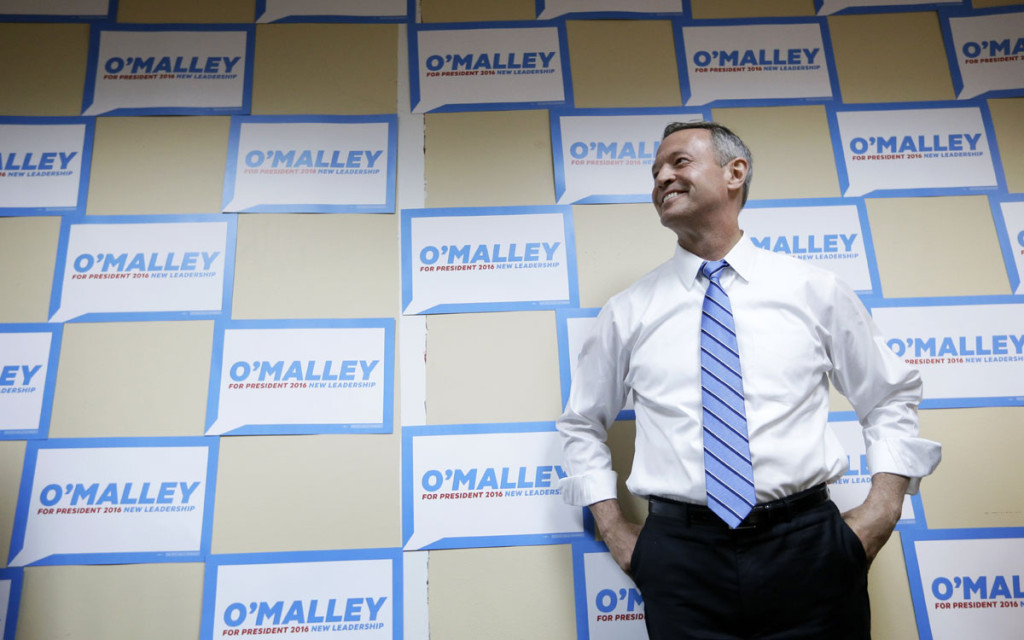
Former Maryland Gov. Martin O’Malley says he won’t seek to become chairman of the Democratic National Committee. O’Malley released a statement Wednesday saying he’s grateful to friends who urged him to consider running, but he won’t seek the chairmanship. He says the committee needs a chairman “who can do the job fully and with total impartiality.” The announcement comes days after O’Malley said he was “taking a hard look” at the position after being approached by “many Democrats who believe our party needs new leadership.” O’Malley ran for president, but he ended his campaign in early February midway through vote-counting in the Iowa caucuses after his bid failed to gain traction against Hillary Clinton and Bernie Sanders. He is a former two-term governor and Baltimore mayor. Republished with permission of the Associated Press.
Minority Dem delegates frustrated with ‘Bernie or Bust’

As most Democrats rally around Hillary Clinton, the lingering “Bernie or Bust” movement is stirring frustration at the party’s convention among delegates of color, who say they’re upset at the refusal of the Vermont senator’s most fervent backers to fall in line. “I am so exhausted by it,” said Danielle Adams, a black Clinton delegate from North Carolina. “I think there are undercuts of privilege that concern me.” Adams is among those who say the “Never Hillary” crowd, a group that is largely younger and white, isn’t considering the struggles black Americans still face every day. And, they argue, how the nation’s ethnic and racial minorities may be affected by a Donald Trump presidency. Rep. Cheryl Brown, a California delegate from San Bernardino who is black, condemned what she called the “aggressive” behavior of some Sanders delegates, saying they jumped on tables and shoved people at the state’s hotel the night that Sanders moved that the convention nominate Clinton by acclamation. “I think here at the convention, it’s been exacerbated by the way they are treating people,” she said. “I haven’t had that happen with any of the African-American Bernie supporters.” Maryland Rep. Elijah Cummings, an African-American and close ally of Clinton, was telling the story of his late father — a share-cropper in South Carolina — on the convention’s first day when Sanders supporters started chanting “No TPP” and holding up signs opposing the trade pact. “It was downright disrespectful,” said Kweisi Mfume, a Clinton delegate and former head of the NAACP, who called it “a low point” of the four-day summer meeting. “I think it does not necessarily help the relations that Bernie’s people may have with the larger African-American community.” To be sure, many black delegates at the convention said they don’t view the “Bernie or Bust” movement through a racial lens. Count Cummings among them. He said that as a veteran of many civil rights protests, he understands the passions that drove the mostly young delegates to shout over his speech. “The optics were not pretty, but I couldn’t be upset with them. Two or three years ago, they would have been outside politics,” he said, adding that more than 100 people have since apologized for the outbursts. “I am so glad these people are under our tent.” Others, meanwhile, are frustrated by Sanders backers who contend the nomination was stolen from the Vermont senator. They say those delegates are ignoring the fact Sanders lost the nomination to Clinton, in part, because he didn’t appeal strongly enough to African-American voters. “They haven’t considered the perspective of minorities,” said Kenneth Williams, a black Clinton delegate from Texas. “I don’t think there was enough there to bridge to that community.” Clinton undoubtedly has far more appeal than Sanders among black voters, a critical voting bloc in Democratic primaries. The former secretary of state won more than three out of four black votes in 25 primary states where exit polling was conducted and, by the end of the primary season, she had swept the 15 states with the largest black populations. “At the end of the day, (Sanders’) coalition looked too much like a modern day Woodstock, and not enough like the Obama coalition it takes to win the primaries and the general,” said Boyd Brown, a Democratic National Committeeman from South Carolina who supported former Maryland Gov. Martin O’Malley. Michelle Bryant, a radio talk host in Milwaukee who is attending the convention, said she’s heard similar concerns from some people who call into her show. She said Clinton has a decades-long history of fighting for racial and economic justice that some Sanders supporters seem willing to dismiss — even as they promote Sanders’ civil rights advocacy. “You wouldn’t have expected this stuff to kind of break out along racial lines,” Bryant said. But those complaining about Sanders supporters and expressing fears of Clinton losing to Trump are missing the point, said Natalie Vowell, a white Sanders delegate from Missouri. Clinton, she said, just hasn’t been a positive for black Americans. “There have been more young black men imprisoned, more brown bodies piling up across the globe, and I’m not sure at this point that a warmonger like Hillary Clinton is any better than a tyrant like Trump,” said Vowell. She said she’s not yet sure if she will vote at all in November. Ohio state Rep. Alicia Reece, president of the Ohio Legislative Black Caucus and a Clinton delegate, said she heard some complaints when a few people booed Michelle Obama when she mentioned Clinton’s name Monday night. But she predicted the party would ultimately come together. “Both groups have strong feelings about what’s going on,” she said. “Even non-African-Americans are afraid of Donald Trump, not just pro-Hillary people. They know we’ve got to unite and stop Trump.” Republished with permission of the Associated Press.
Presidential Primary Brief: 273 days until Election Day
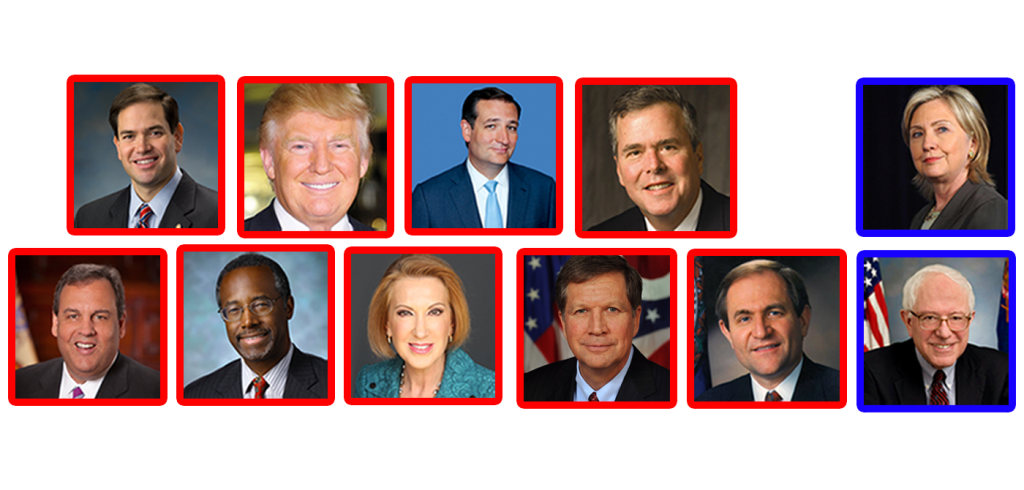
21 days until AL Presidential Primary 273 days until Election Day Convention Dates: Republican July 18-21, 2016, Democratic July 25-28, 2016 Weekly Headlines: Iowa caucuses kick off 2016 presidential election Donald Trump says Ted Cruz stole victory in Iowa caucuses Hillary Clinton wins Iowa caucuses Press Clips: 5 takeaways from the GOP debate (Politico 2/7/16) Here’s what everyone is supposed to write: Marco Rubio, the communal target of the GOP field looking to knock him down, stumbled badly, reciting his pre-scripted pablum of a soulless establishment-candidate cyborg. Meh. Rubio wasn’t great. The morning-after narrative is Marco the Rube — and his weird triple talking-point repeat just might be enough to slow down the young man in hurry, even though the polls have shown him only modestly rising into second place here behind Donald Trump. Marco Rubio slams Obama’s speech on Fighting Islamophobia (Huffington Post 2/3/16) Republican presidential candidate Sen. Marco Rubio (R-Fla.) somehow found a way to criticize President Barack Obama’s speech on Wednesday denouncing anti-Muslim bigotry. Rubio, who often stresses religious liberty and his own faith on the campaign trail, said Obama’s words at a Baltimore mosque were intended to divide, rather than unite, the American people. “I’m tired of being divided against each other for political reasons like this president’s done,” Rubio said at a Wednesday campaign stop in Dover, New Hampshire. “Always pitting people against each other. Clinton’s margin of victory shrinks to 0.25 after Iowa audit (Politico 2/7/16) Hillary Clinton still has defeated Bernie Sanders in the Iowa Democratic caucus, but an internal party review released Sunday found new errors in the original count that further narrowed her margin of victory — a result that’s likely to keep scrutiny on the caucus state while the rest of the country looks to New Hampshire. The audit by the Iowa Democratic Party discovered errors in five of 14 precincts across the state from Monday’s caucuses that shrink Clinton’s overall advantage in the key delegate results to a 0.25 percent lead over Sanders, down from 0.27 percent. Martin O’Malley to drop out of Democratic presidential race (The Wall Street Journal 2/2/16) The first casualty of Iowa’s caucuses is former Maryland Gov. Martin O’Malley, who announced Monday night that he was dropping out of the Democratic presidential race after a disappointing showing. Mr. O’Malley told supporters at a Des Moines bar that he was suspending a campaign that never gained traction against rivals Hillary Clinton and Bernie Sanders. He did not endorse either of the two. With about 90% of the Iowa caucus results reported, Mr. O’Malley stood at less than 1%. Mike Huckabee suspends his 2016 campaign (Politico 2/1/16) Mike Huckabee suspended his bid for the Republican nomination, ending a second run that overshadowed by other candidates in the former Arkansas governor’s social-conservative lane. Huckabee’s announcement concludes a campaign that was not nearly as prominent as his previous run at the Republican nomination in 2008, where he won eight states, including the Iowa caucus. Rand Paul ends presidential bid (USA Today 2/3/16) Kentucky Sen. Rand Paul, who had hoped to ride libertarian support to the Republican presidential nomination, withdrew from the race after a fifth-place showing in the Iowa caucuses. “It has been a privilege to give voice to the liberty movement in this race, and I believe we have broadened the debate by being part of it,” Paul said on Fox News. “Although today I will suspend my campaign for the presidency, I will continue to fight on for liberty, for the Constitution, for justice in the United States Senate.” Paul, 53, is running for re- election in November to a second Senate term. Wednesday morning, he posted this video thanking his supporters on Twitter. Kasich wraps himself in Reagan (Politico 2/7/16) The Ohio governor, who’s fighting to win over more moderate New Hampshire Republicans not enamored of Ted Cruz or Donald Trump, compared himself twice to Ronald Reagan within a few minutes on Sunday in an interview with Jake Tapper on CNN’s “State of the Union.” Tapper asked Kasich about a remark he made on Saturday, when a Democratic voter told Kasich on the trail that Kasich was the only Republican he’d consider supporting. Kasich joked that maybe he “ought to be running in a Democrat primary.” Rick Santorum drops presidential bid, endorses Marco Rubio (CNN 2/3/16) Former Pennsylvania Sen. Rick Santorum ended his presidential bid on Wednesday, throwing his support behind Florida Sen. Marco Rubio. Santorum made the announcement Wednesday night on Fox News’ “On the Record,” saying he spoke with Rubio “for more than hour” Tuesday before making up his mind. Santorum won the 2012 Iowa caucuses and ended that race with the second-most number of delegates to eventual GOP nominee Mitt Romney. But he was unable to capture any momentum this year despite extensive barnstorming efforts in Iowa. He is the third Republican presidential candidate to drop out after Monday’s caucuses. Mike Huckabee ended his campaign that night, and Rand Paul suspended his campaign Wednesday morning. Trump stands by proposal to revive waterboarding (Politico 2/7/16) Donald Trump, who vowed to bring back waterboarding and “a hell of a lot worse than waterboarding,” stood by his proposal on the Sunday shows, while refusing to say exactly how he’d reinstate the harsh and controversial interrogation technique banned during President George W. Bush’s second term. Trump vowed during the Republican debate on Saturday night to bring back waterboarding and “a hell of a lot worse that waterboarding.
The day after the big day: What to watch in NH and beyond
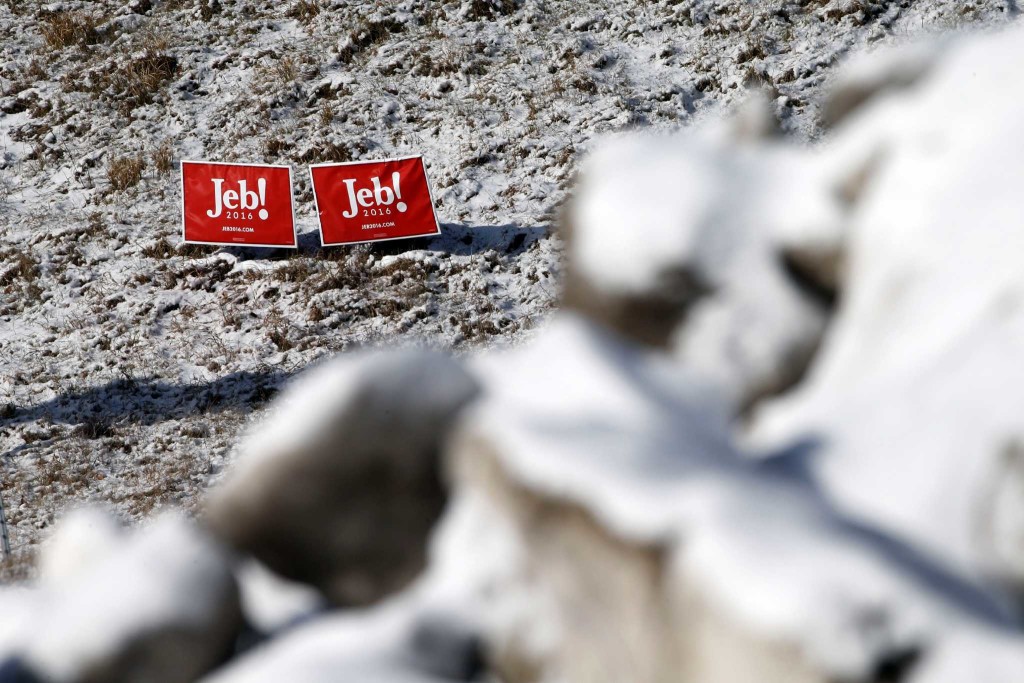
The political suspense isn’t over now that the Iowa caucuses are history. There will be plenty of intrigue to track on the day after, too. What to watch Tuesday: UMM, WHO WON?: The Democratic caucus results were so tight that Hillary Clinton and Bernie Sanders both went to bed unsure who’d won. Will party bigwigs declare a winner Tuesday or simply leave it as a draw? CLAIMING VICTORY: There’s more than one way to define victory. Multiple candidates will try to claim a win simply by exceeding low expectations. Marco Rubio is fashioning his third-place showing as an “important step to winning the nomination.” Rand Paul is trumpeting a “strong top-five finish.” EXIT STRATEGIES: Does Iowa turn into a knockout blow for more bottom-tier candidates? Democrat Martin O’Malley and Republican Mike Huckabee bailed out before midnight on caucus night. More candidates could look for the exits after sleeping on it. SPIN CYCLE – WHY IOWA DOESN’T MATTER: Poor performers in the caucuses will look for ways to play down the importance of Iowa. Ben Carson, for one, complained in his evening speech that he’d been the target of caucus-night dirty tricks. SPIN CYCLE – WHY IOWA MATTERS: Winners and those who exceeded expectations will be happy to play up the significance of the Iowa results. Just how far do they stretch that victory lap? WHERE NEXT? It’s not just where the candidates point their planes, but where they ship all those Iowa staffers who will be packing their bags Tuesday. With New Hampshire just a week away, the state already is flooded with campaign staff and advertising dollars. While most candidates were planting themselves in New Hampshire, Texas Sen. Ted Cruz has stops Tuesday in both New Hampshire and South Carolina; he thinks his conservative message may resonate in the latter state. ADS, ADS, ADS: For Iowans, it’s now safe to turn on the TV; viewers in New Hampshire, beware. From Tuesday forward, presidential candidates and the outside groups helping them are set to spend $11 million on TV and radio ads in the state, according to advertising tracker Kantar Media’s CMAG. By New Hampshire primary night, spending in the state will have topped $116 million. If the month of January is a guide, look for Trump with a side of Trump. Political ads already are popping up in states with later primaries and caucuses: Nevada has $1.7 million in ads scheduled. MONEY CHASE: Beware of inbox overload. Wins and losses have one thing in common: They’re both fundraising opportunities. Expect many breathless emails from the candidates that convert their Iowa performances – fantastic or dismal – into pleas for campaign cash. Iowa winner Cruz had an email out before midnight warning that “I must raise over ONE MILLION DOLLARS in the next 24 hours or I risk wasting our Iowa victory.” ENDORSEMENT CHASE: As candidates exit the race, where do they point their supporters? Donald Trump plans to campaign in Arkansas on Wednesday. Could he be hoping to pick up an endorsement from Huckabee? Republished with permission of the Associated Press.
Presidential Primary Brief: 293 days until Election Day
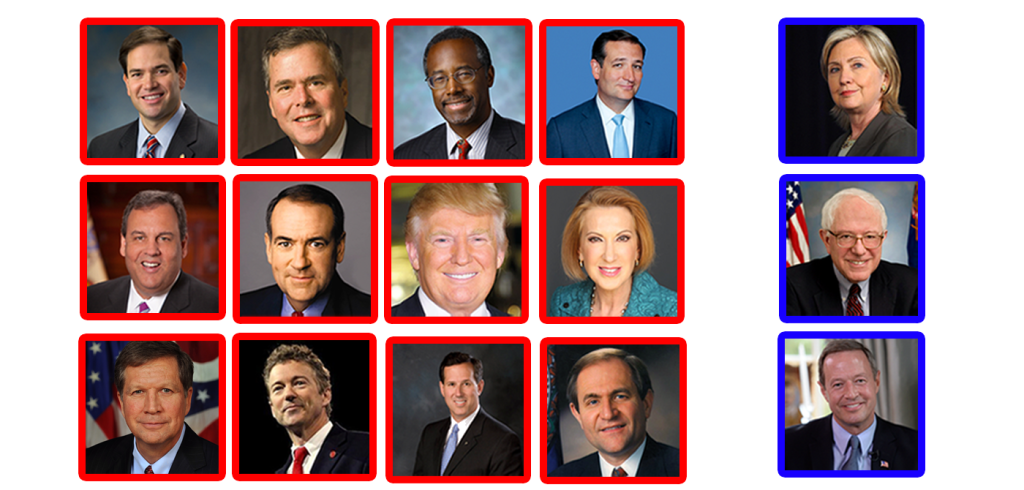
41 days until AL Presidential Primary 293 days until Election Day Convention Dates: Republican July 18-21, 2016, Democratic July 25-28, 2016 Weekly Headlines: Debate over refugees will be heated in 2016 presidential race NBC replaced by CNN for GOP’s Super Tuesday debate Trump bungles Bible reference at Liberty University Press Clips: 5 takeaways from the Democratic debate (Politico 1/18/16) Hillary Clinton, facing an unexpectedly stout challenge from Bernie Sanders, threw diplomatic dignity to the wind in the fourth Democratic debate, attacking the senator even if it reinforced his characterization of her as an establishment politician so desperate she’d say anything to win. Sanders’ stunning gains in New Hampshire and Iowa have put a jolt into a Clinton campaign that had grown increasingly confident at the end of 2015 and forced her to take risks she might have avoided with a firmer grip on her party’s loyalty. In the three previous debates, Clinton adopted an attitude of pre-presidential diffidence, but on Sunday night she was brawling like a Republican, slamming Sanders on guns, health care reform and taxes. Fact checking the sixth round of GOP debates (The Washington Post 1/14/15) Fox Business News aired two GOP presidential debates on Jan. 14: a prime-time event starring seven candidates and an earlier debate featuring three second-tier contenders, based on an average of recent polls. Not every candidate uttered statements that are easily fact checked, but following is a list of 14 suspicious or interesting claims. As a bonus, we also fact-checked comments by Sen. Rand Paul (R-Ky.), who boycotted the second-tier debate and instead appeared on “The Daily Show.” As is our practice, we do not award Pinocchio’s when we do a roundup of facts in debates. Jeb Bush invokes MLK as he unveils education plan (Politico 1/18/16) Former Florida Gov. Jeb Bush offered a sweeping school choice-centric education plan Monday with proposals that would allow parents to spend government dollars on the pre-K program of their choice and give college students a $50,000 line of credit to pay tuition. Bush unveiled his plan on Martin Luther King Jr. Day as he Eights to stay relevant in a GOP race dominated by Donald Trump, Ted Cruz and Marco Rubio, invoking education as a civil rights issue. His plan also includes allowing federal dollars for schools with many low- income students to follow a child to a new school and doubling federal support for charter schools, which are publicly funded but privately run. His campaign said the plan is budget neutral, and it would cut the federal Education Department by 50 percent, but much of what he wants would likely require congressional approval. Christie vs. Rubio heats up in GOP debate (USA Today 1/15/16) The growing rivalry between Chris Christie and Marco Rubio spilled into Thursday night’s Republican presidential debate. The two are battling to become the top so-called establishment alternative to Donald Trump and Ted Cruz. Rubio hit first. “I like Chris Christie, but we cannot afford to have a president of the United States that supports Common Core. We cannot afford to have president of the United States that supports gun control,” he said. “Chris Christie wrote a check to Planned Parenthood,” the Florida senator continued, adding the nation can’t afford to have a president supportive of Barack Obama’s agenda. Clinton dodges question on Obama’s Syria red line (Politico 1/17/16) Hillary Clinton dodged a question at Sunday’s Democratic presidential debate about whether President Barack Obama erred by not taking military action in Syria in 2013 after he laid down a “red line,” vowing to act if chemical weapons were used there. Asked by NBC’s Andrea Mitchell if Obama should “have stuck to his red line once he drew it,” the former secretary of state did a verbal tap dance, saying that the situation worked out for the best since Syrian President Bashar Assad ended up relinquishing his chemical weapons stockpile. Ben Carson back in South Carolina for a week of events (WRDW 1/18/16) Republican presidential hopeful Ben Carson is back in South Carolina this week for a few events, including a discussion on law and the Constitution. The retired neurosurgeon is participating in a forum Monday evening sponsored by the Conservative Leadership Project. At the Brookland Baptist Banquet and Conference Center, Carson is sitting down with state Attorney General Alan Wilson. Fiorina likens Hillary Clinton to Mexican drug lord El Chapo (CNN 1/15/16) Carly Fiorina said Friday that Hillary Clinton is “more qualified for the Big House” than the White House and compared her to the recently captured Mexican drug lord El Chapo. “Hillary Clinton has spent her entire life on a quest for power. She has avoided prosecution more times than El Chapo. Honestly. We’ve run out of ‘gates,’” Fiorina told CNN’s Alisyn Camerota on “New Day.” Fiorina added, “Once again, she wants to be in the White House. The truth is she is more qualified for ‘the Big House.’” That is why I am continuing to talk about the reality of the political establishment – of which Mrs. Clinton is example, exhibit A — the political establishment does not serve the interest of the American people.” How Bernie Sanders’ “political revolution” would change the nation (The Washington Post 1/18/16) What is Bernie Sanders talking about when he says he wants a “political revolution”? The answer is a series of policies that would offer vast new government-funded benefits to individual Americans, including health insurance, paid maternity leave and free tuition at public colleges. To make those things possible, Sanders — a Vermont senator, “democratic socialist” and Democratic presidential candidate — would impose a variety of new taxes on the wealthy, on corporations and on Wall Street trade. He also would give the federal government a new level of control over the college experience, the price of prescription drugs and child care — by making these sectors of the economy far more dependent on federal money. Martin O’ Malley wants “just 10 seconds” (USA Today 1/17/16) When you’re struggling to gain traction in
Hillary Clinton, Bernie Sanders go head-to-head in heated 4th Democratic debate
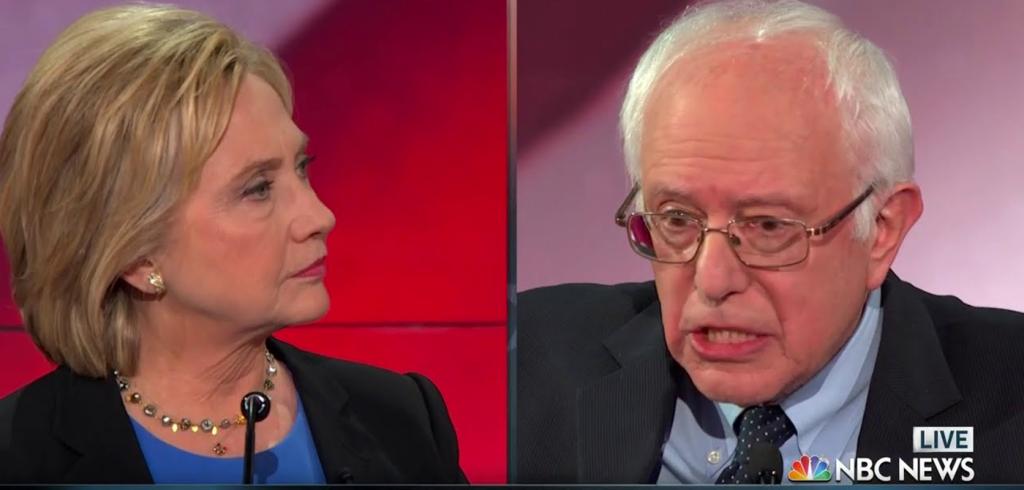
The fourth Democratic presidential debate was held Sunday night in South Carolina and featured presidential hopefuls Sen. Bernie Sanders (I-VT), former Secretary of State Hillary Clinton, and former Maryland Gov. Martin O’Malley. The debate was the final opportunity for candidates to explain and defend their political messages before the first contests of 2016: the Feb. 1 Iowa caucus and New Hampshire primary Feb. 9. Sunday’s debate featured constant barbs thrown between front runners Clinton and Sanders while O’Malley, currently polling in the single digits, often had to fight to get a word in. Chief among the topics discussed at last night’s debate were racial inequality, foreign policy, gun control, climate change, and healthcare. “It is beyond my comprehension how we can elect a President of the United States, somebody like Trump, who believes that climate change is a hoax invented by the Chinese,” Sanders said to laughter from the crowd. Clinton used the debate as an opportunity to tie herself closely to the policies of the Barack Obama administration and to attack Sanders for his criticism of that administration. “President Obama has led our country out of the Great Recession,” Clinton said. “Senator Sanders called him weak, disappointing.” Clinton further tied herself to Obama via healthcare, calling the Affordable Care Act “one of the greatest accomplishments of President Obama, the Democratic Party and our country” and vehemently opposing Sanders’ plan to systematically change healthcare in this country. “What a Medicare-for-all program does is finally provide in this country health care for every man, woman and child as a right,” Sanders said. “The truth is that Franklin Delano Roosevelt and Harry Truman believed that health care should be available to all of our people.” While many of the criticisms pointed at Sanders’ previous vote to protect legal gun sellers from prosecution, the self-proclaimed Democratic Socialist threw punches of his own. Sanders took Clinton to task over the apparent conflict-of-interest surrounding her plans for Wall Street reform while receiving $600,000 in speaking fees from Goldman Sachs. The most humorous portion of the debate, and likely the one that garnered the loudest applause for O’Malley, was when the former governor was asked whether there was anything he’d like to say that he hadn’t been able to during the debate. “Thank you so much, but we’re going to have to get 20 minutes to do it,” O’Malley said after an eruption of applause and laughter. The Democratic candidates will meet again Feb. 11 after the Iowa caucus and New Hampshire primary, before going into the Nevada and South Carolina primaries when, feasibly, the field will be narrowed down to two remaining candidates.
10 must-read quotes from Sunday night’s fourth Democratic debate
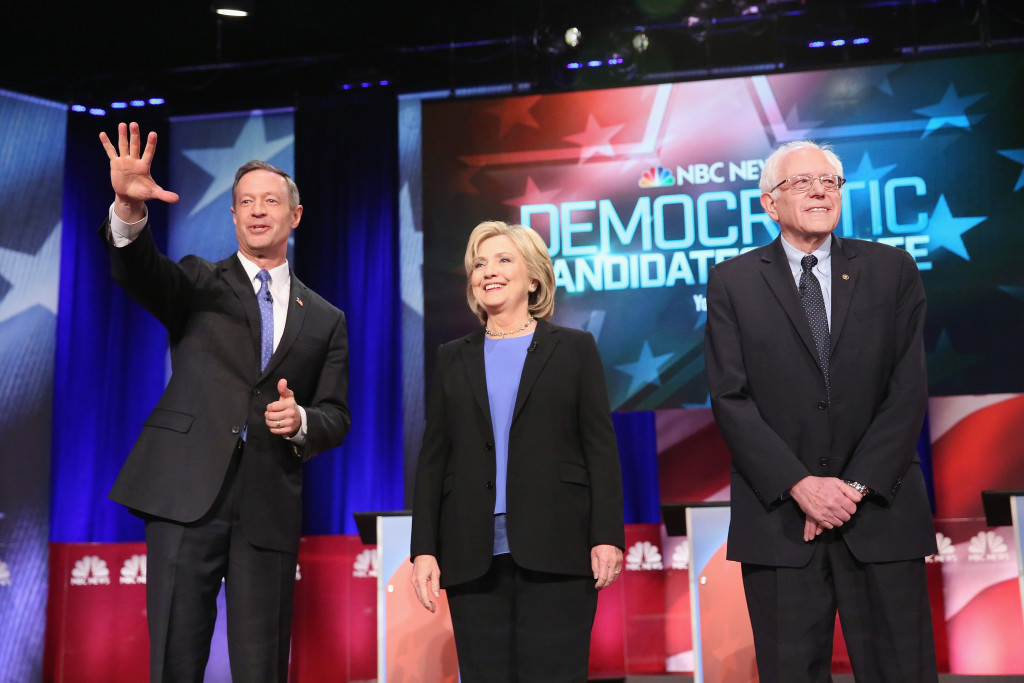
Hoping to win their Party a third consecutive term in the White House, presidential hopefuls Hillary Clinton, Bernie Sanders and Martin O’Malley faced-off Sunday night in the fourth Democratic debate vying for their party’s nomination. Hosted by the Congressional Black Caucus on NBC, the debate took place in Charleston, SC — just blocks away from blocks from the Emanuel African Methodist Episcopal Church where nine parishioners were killed during Bible study in a mass shooting last summer — where the candidates went head-to-head on a variety of hot-topic issues. Below we’ve rounded up 10 of the most significant quotes from the debate. On gun control: MARTIN O’MALLEY: I’ve listened to secretary Clinton and senator Sanders go back and forth on which has the most inconsistent record on gun safety legislation, and I would have to agree with both of them. They’ve both been inconsistent when it comes to this issue. On fundraising: BERNIE SANDERS: Well, the first difference is I don’t take money from big banks. I don’t get personal speaking fees from Goldman Sachs… I have doubts when people receive huge amounts of money from Wall Street. I am very proud, I do not have a super PAC. I do not want Wall Street’s money. I’ll rely on the middle class and working families. On the GOP: BERNIE SANDERS: It is beyond my comprehension how we can elect as president of the United States somebody like Trump who believes that climate change is a hoax, invented by the Chinese. On Obamacare: HILLARY CLINTON: I don’t to want see us start over again with a contentious debate. I want us to defend and build on the Affordable Care Act and improve it. On the criminal justice system: HILLARY CLINTON: There needs to be a concerted effort to address the systemic racism in our criminal justice system. And that requires a very clear agenda for retraining police officers, looking at ways to end racial profiling. More on the criminal justice system: BERNIE SANDERS: We have a criminal justice system which is broken. Who in America are satisfied that we have more people in jail than any other country on Earth, including China? Disproportionately African-American and Latino. Who is satisfied that 51 percent of African-American young people are either unemployed or underemployed. Who is satisfied that millions of people have police records for possessing marijuana when the CEOs of Wall Street companies who destroyed our economy have no police record. On polls: BERNIE SANDERS: Secretary Clinton well knows, when this campaign began, she was 50 points ahead of me. We were all of 3 percentage points. Guess what? In Iowa, New Hampshire, the race is very, very close. In terms of polling, guess what, we are running ahead of Secretary Clinton in terms of taking on my good friend, Donald Trump. On drug abuse: HILLARY CLINTON: We have to move away from treating the use of drugs a as crime and, instead, move it to where it belongs, as a health issue. And we need to divert more people from the criminal justice system into drug courts, into treatment, and recovery. On privacy vs security: MARTIN O’MALLEY: I believe whether it’s a back door or front door, that the American principle of law should still hold that our federal government should have to get a warrant. Whether they want to come through the back door or your front door On Wall Street and big banks: MARTIN O’MALLEY: Look, if a bank robber robs a bank and all you do is slap him on the wrist, he’s just going to rob banks again. The same thing is true with people in suits.
Joe Biden on 2016 decision: ‘I regret it every day’
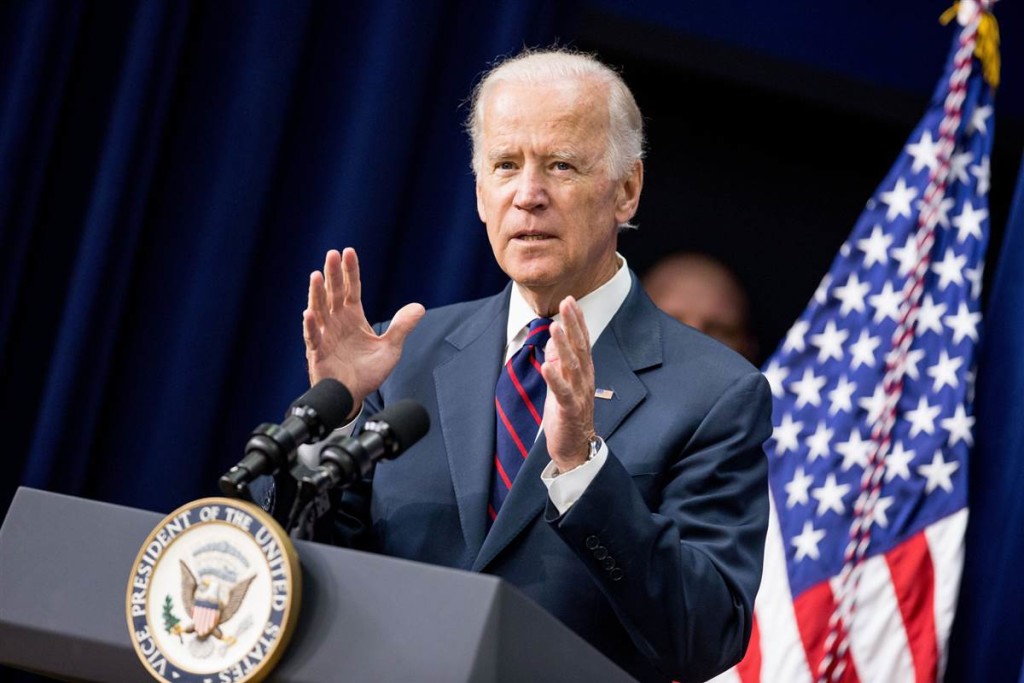
You can take Joe Biden out of the presidential campaign, but you can’t take the campaign out of Joe Biden. Three months after bowing out of the 2016 competition, the vice president has a few second thoughts about his decision. “I regret it every day,” Biden said Wednesday. Still, he said he made the right call for his family and for himself. And he pledged to stay “deeply involved” in the race to replace President Barack Obama. “We’ve got two good candidates,” Biden said, praising Hillary Clinton and Bernie Sanders for engaging in a “robust debate” devoid of personal attacks. He glossed over the third candidate running for the Democratic nomination, Martin O’Malley, whose campaign has struggled to gain traction. The vice president’s musings about the campaign he almost waged came in an interview with WVIT, one of five interviews Biden conducted to promote Obama’s executive actions on gun control. He told the Connecticut television station he was haunted by the thought of the 20 first-graders gunned down in Newtown — “those beautiful little babies in classrooms like dolls, discarded.” Turning to the Republican presidential primary, Biden said it had not been very illuminating so far. He singled out Donald Trump and Ted Cruz for comments they’ve made on the campaign trail. “I promise you, I’ve spoken to three of the presidential potential nominees on the Republican side who tell me, ‘Joe, it’s crazy,’” Biden said. “It’s absolutely crazy.” Biden spent months last year immersed in intensive deliberations with his political advisers and his family about whether to run for president a third time. Weighing heavily on his decision was his 46-year-old son Beau Biden’s death from brain cancer in May. In October, Biden announced that time had run out and that he wouldn’t run. Republished with permission of the Associated Press.
Hillary Clinton campaign reports $37M in primary money in Q4
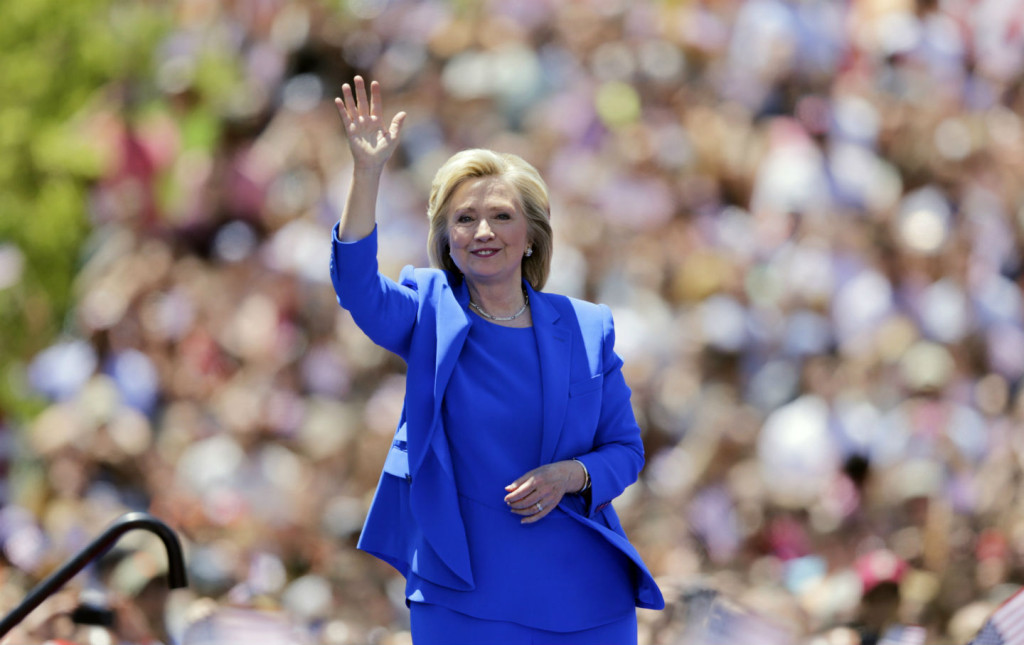
Hillary Clinton‘s presidential campaign said Friday it raised $37 million in the past three months and more than $112 million in all of 2015 to support her bid for the Democratic nomination. Clinton’s team also said she raised $18 million for the Democratic National Committee and state Democratic parties nationwide in the fourth quarter, putting her total haul for the past three months at $55 million. The fundraising for the DNC and state parties is aimed at helping Clinton in the general election should she win her party’s nomination. Clinton’s fourth-quarter amount exceeded the $28 million she raised in the three months that ended Sept. 30. Heading into the January sprint toward the leadoff Iowa caucuses on Feb. 1, Clinton’s campaign said it has nearly $38 million in cash on hand. “Thanks to the hundreds of thousands of Americans who have joined together and powered this historic campaign, we are now heading into Iowa and New Hampshire with the resources we need to be successful,” campaign manager Robby Mook said in a statement. Clinton’s campaign had set a goal of $100 million for the primary in 2015. Clinton’s chief rival, Bernie Sanders, did not immediately report his fundraising totals for the quarter that ended on Dec. 31. But the Vermont senator has collected more than 2 million individual contributions and raised money online at a vigorous pace, taking in about $40 million through the end of September and ending that period with about $27 million in the bank. His campaign has noted that most of its donors have given in small increments — about $20 to $30 apiece — allowing Sanders to return to them repeatedly. While Clinton has built a steady lead in national polls, Sanders remains competitive against her in Iowa and holds a slight advantage in New Hampshire, his New England neighbor which holds its primary on Feb. 9. The third major Democrat in the race, former Maryland Gov. Martin O’Malley, has lagged behind Clinton and Sanders in fundraising and polls. The Clinton campaign said more than 60 percent of its donors in 2015 were women. It also said 94 percent of the donations it received in the fourth quarter came in increments of $100 or less, but it did not say what percentage of its overall fundraising total came from such small-dollar donors. The campaign spent about $75 million in 2015, building large organizations in the early voting states and a data-driven operation to connect with voters. Helped by several fundraisers headlined by former President Bill Clinton, most of Hillary Clinton’s money came via traditional fundraising events, where the price of entry was often the legal maximum donation of $2,700 for the primary. The presidential candidates have until Jan. 31 to report such details to federal regulators. Clinton isn’t alone in releasing some selective details ahead of that schedule. Earlier this week, Republican Texas Sen. Ted Cruz‘s campaign said it had raised nearly $20 million in the fourth quarter. Cruz’s campaign said in a memo to supporters that he will finish the year having raised more than $45 million, but it did not disclose how much the campaign has spent or how much cash it has on hand.
Martin O’Malley fails to qualify for Ohio’s presidential primary ballot

Democratic presidential candidate Martin O’Malley has failed to qualify for Ohio’s primary ballot, falling short of the signatures needed to appear before the state’s voters. A spokesman for Ohio Secretary of State Jon Husted (HYOO’-sted) tells The Associated Press that O’Malley failed to get the 1,000 valid signatures needed to appear on March 15 primary ballots. The former Maryland governor’s campaign submitted 1,175 signatures, but only 772 were found to be valid. O’Malley spokeswoman Haley Morris says the campaign is exploring its options. She says O’Malley will campaign vigorously in Ohio. O’Malley is running an underdog bid for his party’s nomination against Hillary Clinton and Bernie Sanders. Clinton already has the support of some key Democratic insiders in Ohio, where she won the 2008 primary over Barack Obama. Republished with permission of the Associated Press.
Major networks spent 14 hours on candidate coverage in 2015, report shows
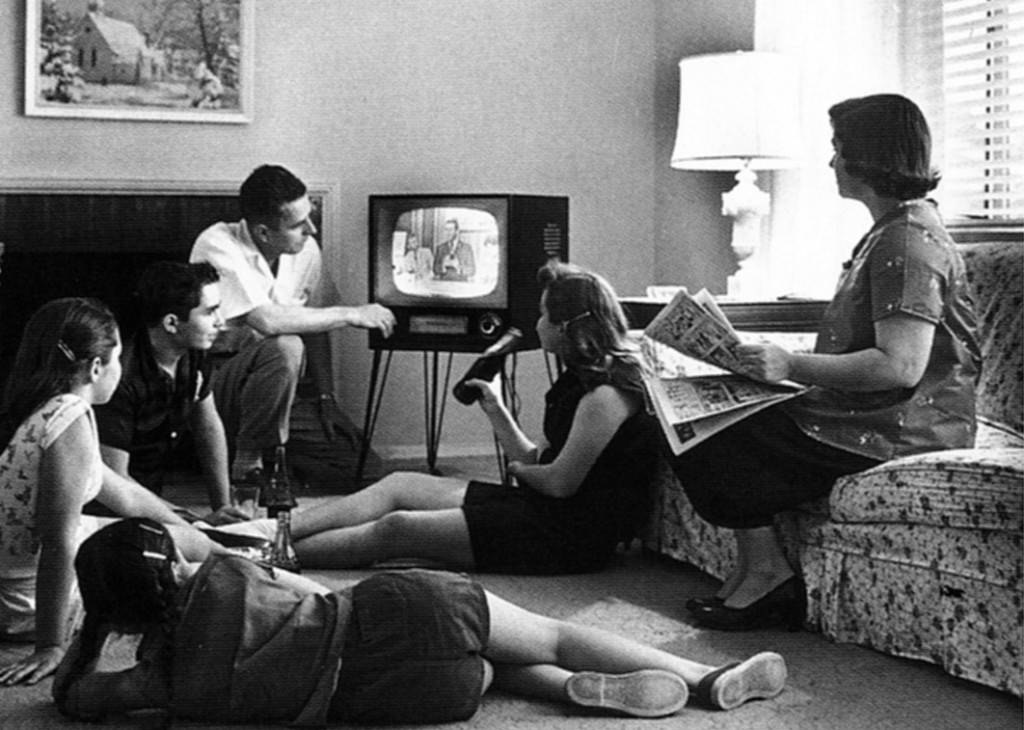
Major networks have already spent more than 14 hours of nightly news airtime covering presidential candidates this year, according to a report detailing broadcast coverage of 2016 presidential candidates. The Tyndall Report, which tallies coverage from ABC, NBC and CBS, found the big three had spent a combined 857 minutes covering 2016 presidential campaigns during their nightly newscasts through the first 11 months of 2015. The figure is high enough to surpass penultimate year coverage totals in six of the last seven presidential election cycles. The lead up to the 2008 election, which also saw a two-term commander in chief exit the White House, was the only cycle to get more coverage. NBC led its rivals with 349 minutes of campaign coverage over the past 11 months. ABC logged 261 minutes while CBS has featured 247 minutes of coverage during its nightly newscasts. Republican presidential candidate Donald Trump has accounted for 27 percent of all network election coverage — about 234 minutes — this year. The real estate magnate’s campaign has received constant coverage since he entered the race in June, whether for policy positions or his holdout tactics leading up to the Republican debates. Coincidentally, Trump’s poll numbers have hovered around the 27 percent range, giving him the highest support among the crowded Republican field. On the whole, GOP campaigns combined for 570 minutes of coverage compared to 226 minutes for the Democrats, which have three candidates still in the race. Florida Gov. Jeb Bush, who just a few months ago was figured to be the GOP front-runner, got the second most coverage in the Republican field with 56 minutes, narrowly edging out retired neurosurgeon Ben Carson, who accounted for 54 minutes of airtime. Florida Sen. Marco Rubio came in third with 22 minutes, followed by Texas Sen. Ted Cruz with just seven minutes. Across the aisle, former Secretary of State Hillary Clinton topped the Democratic field with 113 minutes of coverage. That total, however, doesn’t include the 88 minutes networks spent reporting on the controversy surrounding her use of a private email server during her tenure in the State Department, nor does it include 29 minutes of airtime used to cover investigations into the Benghazi Consulate attack. Other Democratic candidates didn’t fare near as well. Independent Vermont Sen. Bernie Sanders, Clinton’s closest competition in the primary race, received a combined 10 minutes of coverage from the three major networks — less than a fifth of the Vice President Joe Biden’s airtime, despite him never formally entering the race. Former Maryland Gov. Martin O’Malley, who has hovered in the low single digits in most polls of Democratic voters, had no coverage according to the report.
Marco Rubio moves into second place in latest national Quinnipiac poll
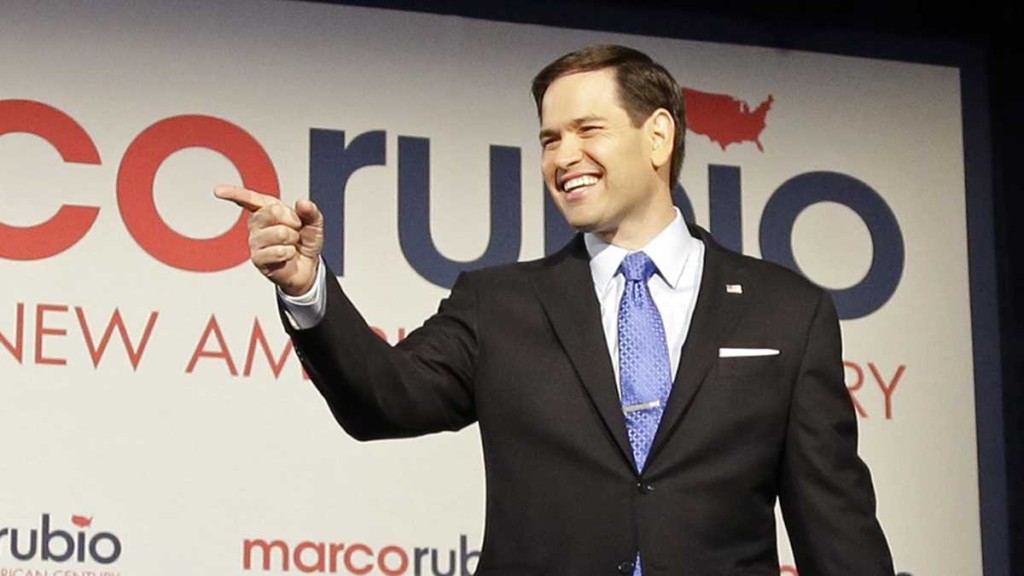
Eleven months before the 2016 presidential election, Donald Trump is the undisputed leader in the Republican field, as Dr. Ben Carson, in a virtual tie with Trump four weeks ago, drops to third place, according to a Quinnipiac University National poll released today. On the Democratic side, former Secretary of State Hillary Clinton widens her lead over Sen. Bernie Sanders to 60 — 30 percent, compared to 53 — 35 percent in a November 4 survey by the independent Quinnipiac University Poll. Martin O’Malley has 2 percent, with 6 percent undecided. Trump gets 27 percent of Republican voters today, with 17 percent for Sen. Marco Rubio, 16 percent each for Carson and Sen. Ted Cruz and 5 percent for former Gov. Jeb Bush. No other candidate tops 3 percent, with 8 percent undecided. Last month, Trump had 24 percent, with 23 percent for Carson. Among Republicans, 26 percent of voters say they “would definitely not support” Trump, with 21 percent who would not back Bush. “It doesn’t seem to matter what he says or who he offends, whether the facts are contested or the ‘political correctness’ is challenged, Donald Trump seems to be wearing Kevlar,” said Tim Malloy, assistant director of the Quinnipiac University Poll. “Dr. Ben Carson, moving to center stage just one month ago, now needs some CPR. The Doctor sinks. The Donald soars. The GOP, 11 months from the election, has to be thinking, ‘This could be the guy.’ “Secretary Hillary Clinton and Sen. Bernie Sanders have to be hoping Trump is the GOP’s guy.” American voters shift to Clinton as the Democrat gains ground against Republicans: 47 — 41 percent over Trump, compared to 46 — 43 percent November 4; Clinton at 45 percent to Rubio’s 44 percent, compared to a 46 — 41 percent Rubio lead last month; Clinton tops Cruz 47 — 42 percent, compared to Cruz at 46 percent to Clinton’s 43 percent last month; Clinton at 46 percent to Carson’s 43 percent compared to Carson’s 50 — 40 percent lead last month. Sanders does just as well, or even better, against top Republicans: Topping Trump 49 — 41 percent; Getting 44 percent to Rubio’s 43 percent; Beating Cruz 49 — 39 percent; Leading Carson 47 — 41 percent. Clinton has a negative 44 — 51 percent favorability rating. Other favorability ratings are: Negative 35 — 57 percent for Trump; 40 — 33 percent for Carson; 44 — 31 percent for Sanders; 37 — 28 percent for Rubio; 33 — 33 percent for Cruz. American voters say 60 — 36 percent that Clinton is not honest and trustworthy. Trump is not honest and trustworthy, voters say 59 — 35 percent. Sanders gets the best honesty grades among top candidates, 59 — 28 percent, with Carson at 53 — 34 percent, Rubio at 49 — 33 percent and Cruz at 43 — 39 percent. All American voters say 63 — 32 percent, including 69 — 27 percent among independent voters, that Clinton would have a good chance of beating the Republican nominee in a head-to- head matchup. Voters are divided 46 — 49 percent on whether Trump would have a good chance of beating the Democratic nominee, with independent voters divided 47 — 48 percent. From November 23 — 30, Quinnipiac University surveyed 1,453 registered voters nationwide with a margin of error of +/- 2.6 percentage points. Live interviewers call landlines and cellphones. The survey includes 672 Republicans with a margin of error of +/- 3.8 percentage points and 573 Democrats with a margin of error of +/- 4.1 percentage points.


